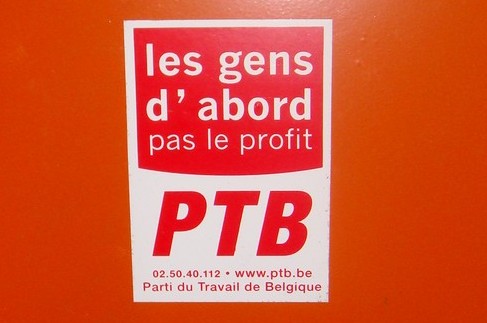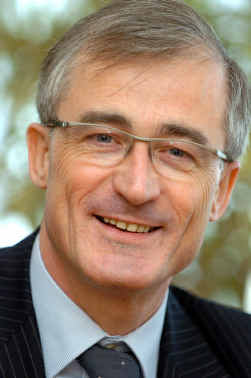|
Wilmès I Government
The Wilmès I Government was a caretaker Federal Government of Belgium, led by Prime Minister Sophie Wilmès, the first ever female Prime Minister of Belgium. History The creation of the Wilmès Government was announced on 26 October 2019, when previous Prime Minister Charles Michel announced he would be succeeded by Sophie Wilmès ultimately on 1 November 2019, effectively forming a new government. Charles Michel left his post as he had been elected to become the next President of the European Council as from 1 December 2019 and wanted to have sufficient time to prepare for his role as President of the European Council hence leaving already by November. The Wilmès Government was governing as a caretaker government, until a new cabinet was formed based on the results of the federal elections of 26 May 2019, for which negotiations were still ongoing. Hence the government was a continuation of the centre minority coalition cabinet of Christian Democratic and Flemish (CD&V) ... [...More Info...] [...Related Items...] OR: [Wikipedia] [Google] [Baidu] |
Sophie Wilmès
Sophie Wilmès (; born 15 January 1975) is a Belgian politician who served as the prime minister of Belgium from 2019 to 2020. She later served as minister of Foreign Affairs from 2020 to 2022. A member of the Reformist Movement, she is the first woman to hold either position.Marine Strauss (1 October 2020Finally, a government after 652 days: New Belgian PM debuts at EU summit''Reuters''. Wilmès was elected to the Chamber of Representatives in 2014, and served as budget minister in the first and second governments of Charles Michel from 2015 to 2019. In the aftermath of the 2019 Belgian federal election, Philippe of Belgium appointed Wilmès to lead a caretaker government (the Wilmès I Government) before she formed an executive government (the Wilmès II Government) in March 2020 to handle the COVID-19 pandemic. In October 2020, she joined the government of Prime Minister Alexander De Croo as foreign minister and deputy prime minister. Early life Wilmès was born in ... [...More Info...] [...Related Items...] OR: [Wikipedia] [Google] [Baidu] |
2019 Belgian Federal Election
Federal elections were held in Belgium on 26 May 2019, alongside the country's 2019 European Parliament election in Belgium, European and 2019 Belgian regional elections, regional elections. All 150 members of the Chamber of Representatives (Belgium), Chamber of Representatives were elected from eleven multi-member constituencies. The far-right Vlaams Belang (VB) saw a resurgence in Flanders, and with the New Flemish Alliance (NVA), parties subscribing to Flemish separatism and Flemish nationalism, nationalism obtained nearly 50% of the vote in Flanders. The Swedish coalition of N-VA, CD&V, MR and Open VLD lost more than a quarter of its seats, the worst government punishment in 20 years. In addition, gains for the far-left Workers' Party of Belgium (PVDA-PTB), and the green Ecolo party in Wallonia occurred. Overall, Political parties in Belgium, traditional parties suffered losses in both regions. Background Following the 2014 Belgian federal election, 2014 elections, a centr ... [...More Info...] [...Related Items...] OR: [Wikipedia] [Google] [Baidu] |
Vlaams Belang
, ideology = , predecessor = Vlaams Blok , position = , europarl = Identity and Democracy , european = Identity and Democracy Party , youth_wing = Vlaams Belang Jongeren , colours = , headquarters = Madouplein 8 bus 91210 Brussels , website www.vlaamsbelang.org, seats1_title = Chamber of Representatives , seats1 = , seats2_title = Senate , seats2 = , seats3_title = Flemish Parliament , seats3 = , seats4_title = Brussels Parliament , seats4 = , seats5_title = European Parliament , seats5 = , seats6_title = Flemish Provincial Councils , seats6 = , flag = Vlaams Belang (, , VB) is a Flemish nationalist, anti immigration, right-wing populist political party in the Flemish Region and Brussels Capital Region of Belgium. Vlaams Belang is a rebrand of Vlaams Blok, which dissolved after a ... [...More Info...] [...Related Items...] OR: [Wikipedia] [Google] [Baidu] |
Workers' Party Of Belgium
The Workers' Party of Belgium (french: Parti du Travail de Belgique, PTB; nl, Partij van de Arbeid van België, PVDA; ) is a Marxism, Marxist and Socialism, socialist political parties in Belgium, political party in Belgium. It is one of the few Belgian parties that is a fully national party, representing both Flanders and Wallonia. Having traditionally been a small party, the PTB-PVDA has gained momentum since the 2010s, continuously scoring better at the polls and elections, particularly in Wallonia and working-class communities in Brussels. History The Workers' Party of Belgium originated in the student movement at the end of the 1960s. Students (organized in the student union ''SVB'' - ''Studenten VakBeweging''), mainly from the Catholic University of Leuven (1834–1968), Catholic University of Leuven, turned towards the working-class movement. They considered the politics of the existing Communist Party of Belgium Marxist revisionism, revisionist, i.e. too much turned to ... [...More Info...] [...Related Items...] OR: [Wikipedia] [Google] [Baidu] |
New Flemish Alliance
The New Flemish Alliance ( nl, Nieuw-Vlaamse Alliantie, N-VA) is a Flemish nationalist and conservative political party in Belgium. The party was founded in 2001 by the right-leaning fraction of the centrist-nationalist People's Union (VU). The N-VA is a regionalist and separatist movement that self-identifies with the promotion of civic nationalism.Manifesto of the New Flemish Alliance point 13: "Inclusion for newcomers" (in Dutch). It is considered part of the ; the party strives for the peaceful [...More Info...] [...Related Items...] OR: [Wikipedia] [Google] [Baidu] |
DéFI
DéFI () is a social-liberal, liberal, regionalist political party in Belgium mainly known for defending French-speakers’ interests in and near the Brussels region. The party is led by François de Smet, a member of the Chamber of Representatives. The party's current name, ''DéFI'' or ''Défi'', was adopted in 2016 and is a backronym of ''Démocrate, Fédéraliste, Indépendant'' (literally, "Democratic, Federalist, Independent") meaning "challenge" in French. History The party was founded as the Democratic Front of Francophones (''Front Démocratique des Francophones'', FDF) on 11 May 1964 as a response to the language laws of 1962. The party had instant success in Brussels: it first contested parliamentary elections one year later, where it won one senator and 3 seats in the Chamber of Representatives for the constituency of Brussels. Its number of seats increased further in the subsequent parliamentary elections. The party also dominated Brussels' municipal politics u ... [...More Info...] [...Related Items...] OR: [Wikipedia] [Google] [Baidu] |

